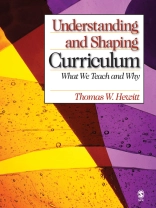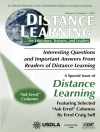Understanding and Shaping Curriculum: What We Teach and Why introduces readers to curriculum as knowledge, curriculum as work, and curriculum as professional practice. Author Thomas W. Hewitt discusses curriculum from theoretical and practical perspectives to not only acquaint readers with the study of curriculum, but also help them to become effective curriculum practitioners.
Key Features:
- Emphasizes the various dimensions of curriculum practice: Becoming a curriculum practitioner requires understanding academic-practice knowledge, the forces shaping curriculum, the array of curriculum work from policymaking to evaluation, and how those are integrated forming a sense of professional practice. This book examines curriculum knowledge that is both academic and practice based.
- Brings theoretical concepts to life: ′Perspective into Practice′ sections illustrate the relevance of the material to both elementary and secondary school settings and contexts. In addition, end-of-chapter resources provide ideas for further discussion and assignments that address different roles and the various dimensions of curriculum practice.
- Examines current issues: Part of being a good practitioner is understanding the inevitability of change and the necessity to keep current about issues and trends that affect both the knowledge and the work of curriculum. Separate chapters on issues and trends give students the opportunity to explore what is happening in today′s schools and curriculum.
Intended Audience: This is an ideal text for masters and doctoral-level courses on Curriculum, Curriculum Development, and Curriculum Design.
Daftar Isi
INTRODUCTION
Society And Schooling
The Importance of the Critical Perspective
PERSPECTIVE INTO PRACTICE: Domains of Knowledge in a Social Studies Lesson
Key Ideas to Guide Study
THE WORLD OF CURRICULUM
IN SEARCH OF CURRICULUM
Historical Constructions of Curriculum
Curriculum Inquiry and the Tyler Rationale
Curriculum Reconceptualized and Redefined
PERSPECTIVES INTO PRACTICE: Curriculum Reconceptualized and Redefined
Perceptions About Curriculum
Envisioning Curriculum Study
CURRICULUM WORK AND PROFESSIONAL PRACTICE
Curriculum Workers
Curriculum Work
Settings for Curriculum Work
Becoming a Professional Curriculum Practitioner
PERSPECTIVE INTO PRACTICE: Application of Personal and Professional Perspectives in an Elementary and Secondary Classroom
Doing Curriculum Work
CREATING CURRICULUM
Origins of Curriculum Development as Curriculum Work
Key Factors in Curriculum Development
Expanding the Conception of Curriculum Development
Essential Knowledge for Doing Curriculum Development Work
PERSPECTIVE INTO PRACTICE: How Selected Knowledge Essentials Apply to Elementary and Secondary Curriculum
KNOWLEDGE BASES THAT SERVE CURRICULUM
KNOWLEDGE AND THEORIES ABOUT CURRICULUM
The Curriculum Knowledge Base
PERSPECTIVE INTO PRACTICE: Applying discipline knowledge in development of a lesson in geography
Discipline Perspectives
Curriculum Orientations and Interests
Learning Theory and Curriculum
Inquiry Traditions and Curriculum
METHODS AND TOOLS FOR CURRICULUM WORK
Knowledge Tools and Curriculum Tools
Curriculum Theory
Curriculum Models
PERSPECTIVE INTO PRACTICE: Curriculum Models in a Language Arts Lesson
Curriculum Critique
HISTORICAL FOUNDATIONS OF CURRICULUM
Roots of American Curriculum
18th Century Curriculum in America
19th Century Curriculum in the United States
20th Century Curriculum: The Progressive Movement and After
Into the 21st Century: New Policy Initiatives and the Curriculum
PERSPECTIVE INTO PRACTICE: Examples from the History of Curriculum Change
SOCIAL, CULTURAL, AND INTELLECTUAL FOUNDATIONS OF CURRICULUM
Curriculum and Episodes of Social and Cultural Change
Impact of Social Sciences on Curriculum
Curriculum Content and the Humanities
Philosophy and Curriculum Knowledge
Educational Philosophies and Curriculum
PERSPECTIVE INTO PRACTICE: Ideas from the Social Sciences, the Humanities, and their Application in Elementary and Secondary Curriculum
WHAT CURRICULUM PRACTITIONERS DO
POLICYMAKING AND PLANNING IN CURRICULUM
Policymaking in Curriculum Work
PERSPECTIVE INTO PRACTICE: Policy Examples at the Elementary and Secondary Level
Planning in Curriculum Work
State and Local Policy and Planning
National and Regional Policy and Planning
DEVELOPING AND ADAPTING CURRICULUM
Creating Curriculum Development
A Sample Curriculum Development Process
Curriculum Adaptation
PERSPECTIVE INTO PRACTICE: Classroom Adaptations of Elementary and Secondary Curriculum
Curriculum Alignment
Assessing Curriculum Development and Adaptation
IMPLEMENTING AND MANAGING THE CURRICULUM
Management in Curriculum Work
Managing the Curriculum Mission
Forming a Curriculum Management Strategy
Curriculum Management Tools
Managing for Quality
PERSPECTIVE INTO PRACTICE: Quality Control in K-12 Curriculum Management
Key Issues in Management: The Reality and the Ideal
EVALUATION IN CURRICULUM WORK
Curriculum and Accountability
The Processes of Assessment and Evaluation
Doing Evaluation in Curriculum Work
PERSPECTIVE INTO PRACTICE: Examples of Curriculum Assessment-Evaluation Tasks at the Elementary and Secondary Level
CHALLENGES OF CURRICULUM CHANGE
INTERPRETING CONTEMPORARY CURRICULUM ISSUES
Theme: Control of Schooling and Curriculum
Theme: Schooling, Curriculum, and Reform
Theme: Accountability in Schooling and Curriculum
Theme: Effects of Social Change on Schooling and Curriculum
PERSPECTIVE INTO PRACTICE: How Selected Issues Might Affect Elementary and Secondary Schooling
INTERPRETING TRENDS IN CURRICULUM
What is a Trend?
Trend: Technology and Reticulation
Trend: Shifting Ideologies and Change
Trend: The Impulse of Globalization
Trend: Re-thinking Schools and Schooling
Trend: The Rising Importance of Curriculum
PERSPECTIVE INTO PRACTICE: Selected Trends and Their Possible Impact at the Elementary and Secondary Level
Tentang Penulis
Born and raised in Michigan, Tom received his Bachelor of Arts degree in Political Science and History from Western Michigan University in 1960. Following a tour of duty as a Lieutenant in the US Army he completed his masters in History at WMU, taught in middle school and then at Oakland Community College in Detroit. In 1968 he married Sheri and moved to Texas where he earned his doctorate in Curriculum & Instruction at the University of Houston. He worked for a foundation in San Antonio, Texas, for three years and then took a faculty position at Kansas State University. In 1979 he accepted a position at the University of South Alabama in Mobile, where he served a term as chairperson of the University Faculty Senate and chaired the Department of Elementary and Early Childhood Education. At KSU and USA he was a successful grant writer, taught courses in elementary and secondary social studies and curriculum for the undergraduate, masters, and doctoral programs. Opting for an offer of early retirement in 1999, he segued into a new career of consulting, writing, traveling, reading, surfing the Internet, bird watching, and tending his flower garden. He also enjoys cooking, dinner parties with friends, Mardi Gras, singing tenor with his wife in the church choir, sharing life with their married children, and contemplating future ventures.












